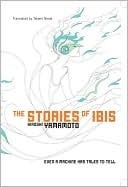What do you think?
Rate this book


In a world where humans are a minority and androids have created their own civilization, a wandering storyteller meets the beautiful android Ibis. She tells him seven stories of human/android interaction in order to reveal the secret behind humanity's fall. The tales Ibis tells are science fiction stories about the events surrounding the development of artificial intelligence (AI) in the twentieth and twenty-first centuries. At a glance, these stories do not appear to have any sort of connection, but what is the true meaning behind them? What are Ibis's real intentions? None
466 pages, Kindle Edition
First published January 1, 2006